NEW DESIGN AND DEVELELOPMENT OF ESKIG MOTORCYCLE
Eskinder Girma
PG Student
Department of Automobile Engineering,
M.I.T Campus, Anna University, Chennai-44, India. Email: eskindergrm@gmail.com Mobile no:7299391869
Abstract
This paper work is on motorcycle body optimization, how to carry more number of passengers with comfort and safety. The ordinary motorcycle has only one driver seat and passenger seat: and specified as one rear wheel and twins shock absorber. The new ESKIG motorcycle’s modeling and analysis is done on one driver and three passengers size and load with considering backrest. This motor cycle having a large seating length, two twins shock absorber and dual rear wheel. The drive system of dual rear wheel is derived by two chain and sprocket assembly on either side with the same gear ratio; both wheels do not have independent suspension. The first stage of the work was developing a preliminary design of motorcycle using appropriate assumption and mathematical calculation. This can be done with the help of wire- frame, 3D modeling and kinematic simulation of computer aided analysis software. The parametric computer aided design is develop by considering necessary assumption with comparing to data books.
INTRODUCTION
Motorcycle body consists of different types of parts, links and joint. Basically its body is made from tubular steels. The parts can be categorized as wheel assembly, front and rear suspension, engine and transmission, frame swingarm. The most common form of front suspension for a motorcycle is the telescopic fork. The forks can be most easily understood as simply large hydraulic shock absorbers with internal coil springs. They allow the front wheel to react to imperfections in the road while isolating the rest of the motorcycle from that
motion. The top of the forks are connected to the motorcycle's frame in a triple tree, which allows the forks to be turned in order to steer the motorcycle. The bottom of the forks is connected to the front axle around which the front wheel spins.
The focus of preliminary design is to determine approximate dimensions, weight, torque power, load limit and other physical characteristics for an optimum limousine motorcycle design, which best maximize scores for competition. The main areas of concern increase maximum load. The entire routine is modeled based on the conceptual design, with carefully considering the specific requirement of the competition.
PRELIMINARY BODY DESIGN OF ESKIG MOTORCYCLE
Computer modeling helps to analyses, to visualize, and study static and dynamic behavior of the machine; moreover it is a tool for optimizing and simulating the design variables. The CATIA model of the project is properly represent basic of ESKIG motor cycle, and it uses to visualized the conceptual idea in the form of three dimensional design in addition can able to studying easily all behavior of new concept.
The complexity of the operating variable can be simplified by taking appropriate assumption. This help to develop a preliminary design. It is feasible representation conceptual idea model. The very beginning of this project work is to develop a model using appropriate assumption and mathematical approximation then conceptual design is feasibly represent using mathematical computer simulation
software package in CATIA and CAD all dimension of preliminary design is present on appendix I.
The model of motorcycle is divided in to two sub-assembly, front wheel assembly and rear wheel assembly, the study and modification is mainly concern on rear wheel assembly.

Figure 1. Preliminary Front wheel assemblies
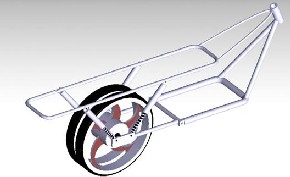
Figure 2. Preliminary design of Rear wheel assembly
Front wheel assembly is the same as others motorbike. The two assembly connected with steering column as a joint which is parallel to the fork this helps the front wheel to steer either direction, is called the steering axis. Rake angle is angle formed by the steering axis and vertical line. The amount of rake is significant in determine motorcycle’s handling characteristics in general more rake provides greater straight line stability, les rake makes the bike more responsive, a large value of trail also create more straight line stability. That is why the forks on a sport bike are more vertical than those of cruiser. The full assembly preliminary model of ESK motorcycle frame is shows below.
SWING ARM MODIFICATION
The swing arm is used to mount the rear wheel of the motorcycle. It also provides the pivot point for the rear suspension of the motorcycle. Typically the swing arm supports on both sides of the wheel. Most standard swing arms also provide for the mechanical adjustment of the drive chain. Standard swing arms come in a variety of sizes up to a 360mm size tire. There are now several different types of single sided swing arms on the market most of which follow the standard manufacturing process of welding multiple pieces together to create the swing arm.
The forces acting on swing arm are suspension force or total weight through the shock absorbers and chain force during braking which is towards the pivot point.
An H-shaped type swing arm can be modified as; one side of it that pivot to frame is having the same dimension as the ordinary swing arm but the other end should be wider because it holds together two rear wheel, two sprocket chain assembly and two rear wheel drum brake which is actuated by single string in addition to this there should be some clearance. The point where four suspensions is fix and its detection of force is shown on the figure
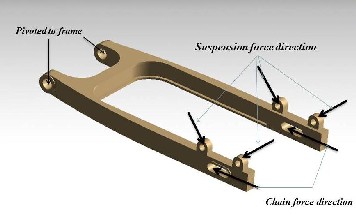
Figure.3. Modified Swing Arm
SUSPENSION DESIGN AND ANALYSIS
The frame of motorcycle is made up of a circular tube and a triangulation construction gives enough strength. Frame carries all the loads such as engine transmission, passengers and other accessories, in addition to this it holds the front and rear tire assembly with the help of suspension. Front suspension is telescopic type and spring type suspension
The passenger seat length is depending on number of the passenger and side size of the passenger the strength and stiffness of the seat is mainly depending on the total weight of the passenger. This load is transfer to the wheel through shock absorber. Both end of shock absorber is jointed to the suspension and swing arm by the pivot joint it allowed a cylindrical motion about their axis. If the seat need to carry more number of passenger it should elongate thus if it is so the deflection of the frame at the rear end should be small and the stress distribution on the pivot point should be high thus additional shock absorber necessary. The FEA catia results of is give certainty for this idea as shown below. The analysis is done on 30mm external diameter and 25mm internal diameter for both cases boundary Condition

case 1 FEA Stress Analysis of Two pt Pivoted
Case 2 F EA Stress Analysis of Four pt Pivoted Seat
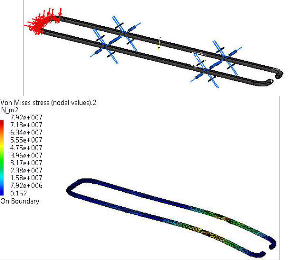
Case 1 consider as 4 number of passenger and the distribution load is taken as average weight of one passenger 80kg total 320kg. Force acting on the seat frame on downward direction. The suspension is acting only a single pair point as shown the maximum vonmess stress value at pivot point is 5.25e+8 on steel material and maximum deflection gives 54.2mm it is too much
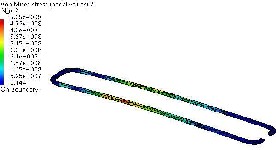
Case 2 the same distributive load is taken as in case 1 and the suspension is acting on two pair point as shown on appendix 2 the maximum vonmess stress is at pivot point is 7.92e+7 on steel material and maximum deflection gives 2.16mm comparatively it is too small. The main part of the motorcycle body is frame; it holds all the parts together. The front wheel and the rear wheel are integrated to the frame by means of telescopic shock absorber and suspension on the rear side and other engine accessories holds in the frame itself. This study mainly concern with the vehicle enable to load more number of passenger compare to ordinary one i.e one driver and three passengers comfortably in other word it concerns with elongating the frame seat portion.
MOTORCYCLE FRAME DESIGN
The length of seat frame can be obtained by considering four person seat dimensions. The ordinary motorcycle can able to load two person one driver and one passenger. The dimension obtained from the literature survey The seat should be enough for four side seat of the person and back rest . From the literature survey the maximum seat dimension is shown in the table. But in this case for passenger’s single seat and back rest can be taken as between seat 340mm and back rest length 230mm and wide narrow 100mm and widest 300mm
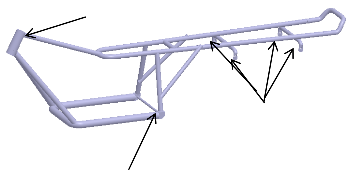
Front wheel steering pivot
Rear wheel suspension point
Swing arm pivot point
Figure 4. Modified frame
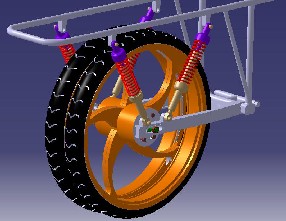
Figure 5. Suspension Assembly
If case 1is taking as a working design, to overcame the stress and deflection in a save limit we
have to increase the size or thickness of material this leads to increase weight on the total mass. Thus instead of, it is possible to add extra suspension on both side by this it is able to overcome the problem above mentioned and the design of rear suspension is as shown below on fig. 5
FORCES ANALYSIS ON REAR WHEEL
The forces describe on suspension analysis is the same force that describe on section 3.5.1 i.e Tractive force (Tr), Reaction vertical force (Fn), Suspension force (Fs ), Chain force (Fc), Braking force (Fb) and Lateral side force (FL).
Consider figure 4.5. In ordinary motorcycle suspension force is acting at an angle and the decomposition of force in to vertical and horizontal the vertical component force (FSV) is tack care of the weight of the passengers but the horizontal component force (FSH) is creating a back ward force on the rear wheel but in the new model both horizontal component suspension forces is directed to each other and cancel the only vertical component forces are applying on rear wheel.
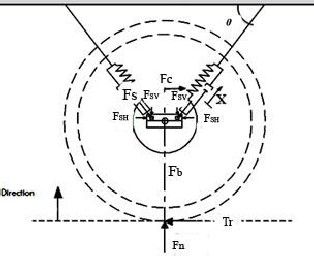
Figure 6. Forces Acting on Rear wheel of
Motorcycle on Longitudinal Plane
DESIGN OF DRIVING MECHANISM
The main propelling force for motorcycle is chain force. The torque produced by the engine is transmitted to rear wheel of the motorcycle at high transmission ratio, through chain and sprocket assembly.
Installing additional chain assembly on either side can has advantage to reduce twisting moment on tire. The new design is driven by two chains on both sides this help to use all the torque which is produce from engine on propelling the vehicle, the drive assembly is shown on fig. 7.
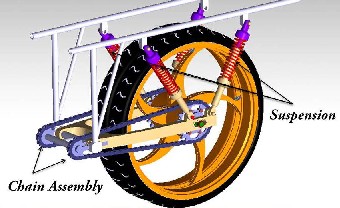
Figure.7. Dual Chain Assembly
ESKIG motorcycle design and modeling is mainly concentrating on rear wheel body modification and design. But the front wheel assembly, fuel tank, telescopic shock absorber and other engine accessory are the same as ordinary motor cycle. The engine has to propel three passenger including driver and other body weight of motor cycle estimated weight of motorcycle is shown in the table thus the torque requirement is calculated from maximum weight boundary condition
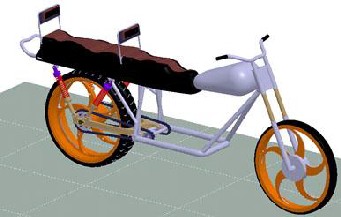
Figure 8. Full assembly of ESKIG Motorbike
Table 2 Specification of new ESKIG motorcycle


Descriptions Quantity
Wheel base 1700mm length

Rear wheel assembly Two

Front wheel assembly One Sprocket(no teeth 42) Two Sprocket (no teeth 19) Two
Rear suspension Double twins

(passion)shock absorber
Front suspension Hydraulic telescopic fork

Chain Two ( 1900mm) length
Seat length 1200mm length

Rear wheel brake Two
Engine specification
-1500cc engine
- Liquid cooled four stroke single cylinder

Dry weight 150kg
Seat height 750mm
COORDINATES REPRESENTATION AND NUMBER DEGREE OF FREEDOM (DOF)
The coordinate system and DOF of the design is consists of four unrelated rotational about their axis this are, steering axis ( ), front and rear wheel rotation about its pin axis ( , ω2) respectively and swingarm rotation during bump and squat about its pivot axis ( ). Front and rear wheel rotations are independent of one another even if it is rear wheel drive. There are three Absolut linear
coordinate X, Y & Z, and three relative linear coordinate i, j & k which are available during non- stationary condition of motorcycle. Slip angle also independent motion on tire axis with respect to drive line of path or x-axis this denoted as . During cornering the the motorcycle make tilting down about the line of front and rear contact patch points which is parallel to x-axis this DOF is denoted as.
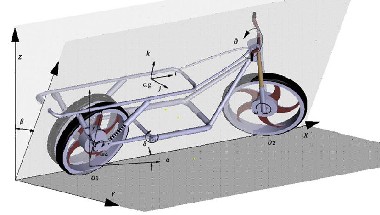
Figure.9. Coordinate System and Number of DOF Table 1 Coordinates System Representation (DOF)
CONCLUSION
The new ESKIG motorcycle model has been developed as per requirement and appropriate design analysis. Due to large seating length this motorcycle can able to carry three passenger and driver comfortably. During riding maximum weight of vehicle transfer to rear wheel thus dual rear wheel helps the bike to resist maximum load of passengers and vehicle weight. The capsize stability of new motor cycle is higher than ordinary single rear wheel bike
Acknowledgment
I express my deep sense of gratitude to Thiru.S.Arul Selvan, Assistant professor, Department of Automobile engineering, M.I.T, Anna University, for constant encouragement for the successful completion of the project work.
REFERANCE
1. Tony Foale “Motorcycle Handling and
Chassis Design”
2. ROBIN S. SHARP (2001) SW7 2BY, U.K.
“A Motorcycle Model for Stability and
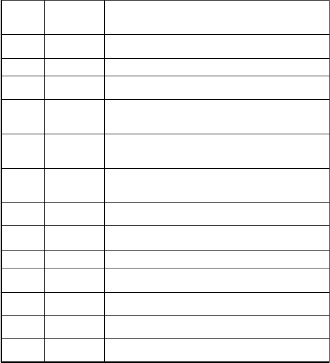
Control Analysis”
No Symbo l
Short Description
3. A.Sponziello, F. Frendo and M. Guiggiani
“Stability Analysis of a Three-Wheeled
1. Absolute coordinate system
2. Y Absolute coordinate system
3. Z Absolute coordinate system
Motorcycle” 2008-32-0062 (SAE)
4. W.Ooms BSc “Motorcycle Modeling and
Control” DCT 2011.014
Contact Email : Eskindergrm@gmail.com













